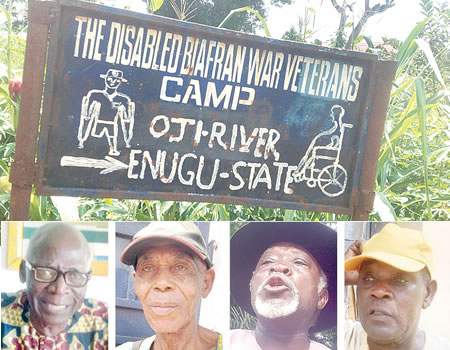THE Nigeria-Biafra civil war has left an indelible mark on the history of the nation. JUDE OSSAI was in Oji River resettlement camp of veterans of the war on the Biafra side and reports that some of the survivors are bitter and feel let down, given their present condition while others advise present-day agitators to explore dialogue instead of beating the drum of war.
When the civil war broke out about 50 years ago, the aim of the agitators for Biafra was that it was going to end with a nation of their own, the Republic of Biafra. But the Nigerian military government, which was fighting to keep the country together hoped to rein in the separatists and bring them back into the fold. Both sides were not certain of how the war was going end, more so how long it would last. Both did not prepare for the calamity and the humanitarian crisis that ensued. The rest as they say is now history.
Forty-seven years after the war has been won on both sides (as the General Yakubu Gowon-led military government had aftermath the war declared a “no victor, no vanquished” entente, the scars are still visible. For many of the ex-soldiers who fought on the side of Biafra, it was an ugly experience they would not want to remember. While some prefer to talk briefly about it, others, especially the ones who were still very young during the wartime, tend to easily open up.
Sunday Tribune visited the ex-Biafra Soldiers’ Camp at Oji-River in Oji-River Local Government of Enugu State penultimate Thursday. The camp looked unwholesome and generally unkempt. Some of the war veterans and/or survivors, who inhabit the camp, were asked about their wartime experiences.
However, in the course of interacting with these veterans, Sunday Tribune gathered that a good number of them have been relocated to Okwe Camp, a settlement built for them by the leader of the Movement for the Actualisation of Sovereign State of Biafra (MASSOB), Chief Ralph Uwazuruike. But the Oji River camp built by the Ukpabi Asika administration in 1975 radiated apparent lack of attention by the government and a desolate atmosphere that reflected the mood and situation of many of its inhabitants.
Indeed, the plight of the ex-Biafra soldiers is no longer news as they have been fighting for full reintegration into the larger society, even when their leader, Dim Chukwuemeka Odumegwu Ojukwu was alive. Many of them had died unsung, regretting their participation in the war.
Going down memory lane, Okechukwu Okubuiro told Sunday Tribune how he was conscripted into the Biafra army as an underaged soldier due to scarcity of volunteers to join the army and was thrown to the war front just after three weeks of training.
“When Biafra lacked soldiers, as people did not want to join the army, they started conscripting people irrespective of their age. I was recruited into the Biafra side in the late 1968. It happened that in my community, the Biafra army brought a list of people to be recruited and my brother, Christopher Oduegwu, now deceased, was among the people whose names were listed. That particular evening, my brother called me and said that our community had enlisted me into the army.
“Though it was actually my brother who was enlisted, they swapped my name with his own. Then my people told me to join the army, even as I was under-aged then. We were five; they took us to the depot at Umukabia in present Imo State. When we got there, our particulars were taken from us.
“The next day, we started training. The training lasted for three weeks. We were taken to Ajali in Anambra State and deployed to 4 Battalion under 53 Brigade, commanded by one Lieutenant Colonel Usodo from Calabar. We were then taken to the war front at Awlaw Sector in present Enugu State.
“I had a very bad experience as a young boy to be part of such a horrible situation like war.
“After one week, we were sent to another battalion located at Umuogem near Awlaw. It was during a parade that one RSM spotted me and called me out, asking what I was doing there. I told him that I was a soldier. He asked me: ‘who enlisted you?’ I told him I was my community’s contribution to the Biafra struggle. He then called out one Christopher who was from my village and I was redeployed to the Officers’ Mess. I was there until the war ended.
“My job was to go to the villagers, buy palm wine and sell to the soldiers. There was no food for us to eat, no water to drink too. Let me tell you the only type of meat we ate during the war was grasshopper; another was lizard. In fact, nobody should even think of another war. War is not good and I will never support it. I prefer dialogue,” he recalled.
Another veteran, Onyema Odiegwu was also a young boy when he joined the Biafra army. He was passionate about the Biafra agitation and wanted the Igbo race to have their own country. His job was to spy on the federal army, a risky job, according to him. Many of his comrades died after falling into the hands of the opponents but he survived.
“The civil war took off immediately after the Saturday coup of January 1966. Between January 15, 1966 and July 5, 1967, you will recall that there were series of negotiations. This affected every life in the East then and I was also affected. I was into espionage. We were picked by Biafra to spy on the enemy’s position. It was risky as many of us died after stepping on mines. When you get to the enemy’s territories, you have to pretend; but if you are unlucky, aggressive soldiers can kill you or detain you.
“We had sworn to on oath. If you were caught and you kept on repeating your earlier statements, they might release you, if you are lucky. If history should replay itself, I cannot take such risk again. I did it because I wanted the Igbo race to survive. The war made me the breadwinner of my family at a very young age. I was a member of the Boys Brigade, popularly called BB.
“During the war, the refugees had nobody to take care of them. They were put up in school compounds. There was hunger in the land, health hazards, food scarcity, because the Nigerian government did not allow the Red Cross free passage to bring food to the people; so there was problem of malnutrition. There was economic blockage,” Odiegwu narrated.
Speaking on the current agitation for Biafra and the new movement being led by Nnamdi kanu, Mazi Okoro Nwankwo from Enugu-Ezike in the present Enugu State, told Sunday Tribune further that he is still regretting the civil war. He is full of regrets for the huge loss of lives due to starvation. Though he was a young man when he joined the Biafra army, today he is of the opinion that if the Biafra side had prepared better, things could have turned out differently.
“We had a lot of deaths, but we lost more of our brothers and sisters to health hazards. Sincerely speaking, more people died out of starvation, compared to the number killed by the federal troops. This was the most horrible part of the war. What is happening now is also the same build-up to what happened during the civil war.
“But if you ask me and a few of us who are veterans, we are telling the young ones to adopt all the available options. I don’t want war; it’s more than what you see. I was 28 years-old then and I was trained as an Intelligence Officer for four months in Enugu. I hail from Enugu-Ezike in present Enugu State. My community was overrun by Nigerian soldiers and I did not go home until after the war. If I was older, I would have advised the Easterners not to go war because we were not prepared.
“We didn’t prepare for it. It was just mere enthusiasm by the Igbo; we suffered so much hunger, ill health, no medical support anywhere, deaths at home and loss of many soldiers. Despite the fact that the Igbo race is still complaining about marginalisation, not having our own fair share of the dividends of democracy, I am not in support of going to war. I believe Biafra could be a reality without firing a bullet.”
Narrating his experience, Mazi Francis Njonku, an ex-Biafra soldier living with physical challenges due to injuries sustained during the war, said it was a tough experience for him. It was a war that was underlined by severe pain, suffering, hunger and malnutrition among children. “Many of us are still suffering the effect of the war up to this day,” he said.
Mazi Njonku, who said he hails from Ikeduru in Imo State and was enlisted into the Biafra Army with number 498653, noted that only those who had never fought in a war beat the drum of war.
“I have eight children and only God knows how we are surviving. No help from anybody,, even relations, how much more of government. I have been staying here in the camp since 1975 when Ukpabi Asika, the then Administrator of East Central State brought us here. Nobody cares about us anymore,” he said sadly.
Chukwuma Ikedi lost two of his children during the war. He doesn’t pray for war, despite calls for secession and resurgence of agitation for state of Biafra. For him, it is better to avoid any act of war as the civil war had only taught him a bitter lesson, leaving him with only a sad story to tell.
“I served in the 14 Divisional Brigade headquarters in Owerri. I did not rise much because I was not well educated. Each time the Nigerian military forces came near us, we ran from one village to another. At the sound of aircraft, we had to hide under trees and remove our white shirts in order not to be easily identified by those in the aircraft.
“We slept in markets. During the war, I saw dead bodies, wounded soldiers and civilians alike. It was a bitter story and I pray such calamity will not befall us again. I advise the young ones now to think of other ways to resolve our differences and not go to war. War is an ill wind that blows no man no good,” he admonished.
As for Chidiebere Ikwo, who also spoke with Sunday Tribune, life during the civil war was unimaginable. According to him, he faced starvation and had to eat unimaginable things to survive as he and his comrades wandered from bush to bush, trying to survive the harsh conditions.
“We were starving,” he said slowly as he began his narration of the situation during the war.
“There was kwashiorkor and other terrible illnesses which were as a result of poor feeding. We cooked unripe paw-paw or cassava as yam and ate them because there was no food. We were able to gather insects, lizards, maggots and snails which scattered all over the bush. As we ran inside the bush we saw all these things and we started gathering them; They helped us a lot,” he said.
Despite his past experience, Ikwo still believes in the philosophy of the Indigenous People of Biafra (IPOB) and the Movement for the Actualisation of Sovereign State of Biafra MASSOB), but with a modification. “I prefer dialogue to war and living peacefully with others, instead of acrimony and bitterness towards one another,” he told Sunday Tribune.






